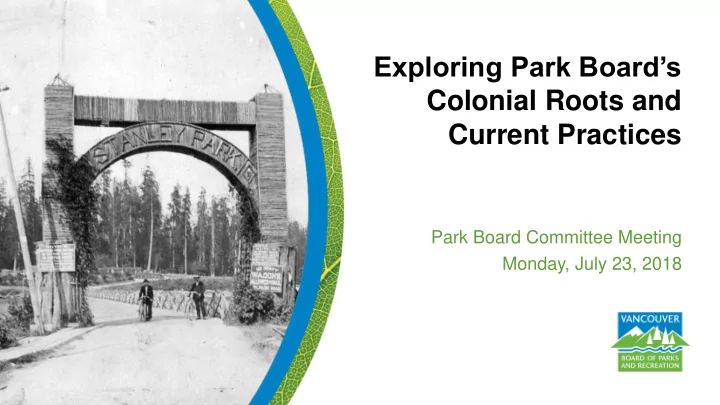

Exploring Park Board’s Colonial Roots and Current Practices Park Board Committee Meeting Monday, July 23, 2018
Purpose of Presentation To report back on the Board April 2018 Board motion titled “Truth and Reconciliation with the Park Board’s Colonial Roots” with initial findings; To provide recommended next steps for furthering the “truth - telling” phase of Truth and Reconciliation. 22
Context Human Occupation in what is now known as Vancouver 23
Background: Key Drivers for Colonial Analysis Unceded Territory Commissioners met with Musqueam, Squamish, & Tsleil-Waututh at Musqueam Cultural Centre in Jan 2015; Board approved 11 Reconciliation Strategies & UNDRIP Adopted as a framework in Jan 2016; Aboriginal Consultation: Truth-telling phase Report received by the Board April 2018 24
Major Areas of Colonial Impact* Dispossession Archaeology Culture Prioritization of non-Indigenous Ways of Knowing *non-exhaustive list 25
Dispossession 26 Image from www.musqueam.bc.ca
Dispossession 1888 – Park Board requests Mayor to notify the “squatters” in Stanley Park to remove themselves 1899 – Park Board attempts to rid park of “Indian buildings at the Narrow” 1909 – Campaign to get rid of “squatters” 1952 – Final residence removed Second Beach, c. 191-? 27
Dispossession Squamish people being sent away from their homes at ̓ áḵw / sən ̓ aʔqʷ Sen c. 1913 28
Beaches 1904 – Acquisition of beach property at English Bay 1905 – Motion requiring the “Jericho Reserve” [possibly ̓ áḵw / sən ̓ aʔqʷ , or Locarno] for Sen park purposes English Bay, 1946 2016 29
Archaeology 30
Archaeology Digging through midden to build a road through Stanley Park 31
Culture 32
Culture - Events By holding the authority over event permitting, Park Board acts as a gatekeeper of cultural expressions in parks and facilities 33
Culture - Activities Park Board is responsible for building facilities and amenities geared for particular activities Those activities serve many members of the community They do not necessarily reflect the cultural practice and sports of marginalized Kitsilano Pool, 1933 communities 34
Culture – Monuments and Memorials The collection of monuments and memorials accepted as donations in public park space speak to what the Park Board deems appropriate to venerate or uphold. Lord Stanley statue in Stanley Park 35
Prioritizing non-Indigenous Ways of Knowing 36
Prioritizing non-Indigenous Ways of Knowing Use of non-Indigenous internal & external expertise to guide stewardship Aesthetic alterations to landscape based on Western European ideals 37
Conclusion 38
Why a Colonial Audit Increased imperative to responsibly steward the land because of climate change, population increase, unabated development, increased economic disparity. Global Temperature Change 39 Source: climate.nasa.gov/vital-signs/global-temperature
Why a Colonial Audit First Nations successfully stewarded the land for millennia, with an embedded worldview that prioritizes long-term planning & human/environment interdependency Lyra Soutar harvesting cedar bark June 2018 40
Why a Colonial Audit A paradigm shift in our approach to stewardship is the most prudent course of action for a more resilient city A study of how the Park Board’s worldview has affected the land and Indigenous peoples will help build stronger relationships with local First Nations and provide opportunities for new models of stewardship and equity 41
Recommendation A. THAT the Vancouver Board of Parks and Recreation receive and acknowledge the Initial Findings for a Park Board Colonial Audit, attached as Appendix A; and, B. THAT the Board direct staff to undertake a comprehensive “Colonial Audit” in order to identify both short term and long term opportunities and specific ways to improve Park Board policies and practices with regard to Reconciliation. 42
Recommendation - Amended A. THAT the Vancouver Board of Parks and Recreation receive and acknowledge the Initial Findings for a Park Board Colonial Audit, attached as Appendix A; THAT the Board direct staff to undertake a comprehensive “Colonial B. Audit” in order to identify both short term and long term opportunities and specific ways to improve Park Board policies and practices with regard to Reconciliation; and C. FURTHER THAT the Board seek an opportunity to formally acknowledge and apologize to representatives of the Musqueam, Squamish, and Tsleil-Waututh peoples for the colonial history and actions of the Vancouver Park Board. 43
Photo credit – Lisa Walker 44
Recommend
More recommend